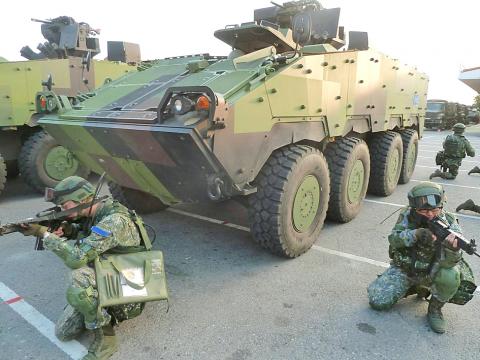Prototypes of an armored vehicle that the nation is developing have passed their tests and are soon to enter mass production, a military official said yesterday.
Four prototypes of the “Clouded Leopard” eight-wheeled armored vehicle passed the required tests on Friday last week, Army Lieutenant General Fang Mao-hung (房茂宏), head of the Armaments Bureau, told lawmakers.
The vehicles, officially called the Taiwan Infantry Fighting Vehicle (TIFV), have passed all 62 categories in the primary pre-mass production tests while failing only two categories in the secondary pre-mass production tests, Fang said.

Photo courtesy of the Army Command Headquarters
Because the test results have met the required standards, the military has initiated mass production of the vehicle — a variant of the CM-32 Clouded Leopard — equipped with a 30mm chain gun, he said.
A total of 284 vehicles are expected to be made in the coming years, Fang said, without elaborating.
A military official said that Taiwan has ordered Orbital ATK 30mm Mk44 Bushmaster II cannons to be mounted on the armored vehicle.
Compared with the CM-32 models that are armed with 40mm automatic grenade launchers, the 30mm cannon offers better anti-tank capabilities and precision firing of several rounds in rapid succession, the source said on condition of anonymity because the person was not authorized to comment on the issue publicly.
Asked if mass production of the CM-32 variant would affect the nation’s plan to buy M1A2 tanks from the US, Army General Yang Hai-ming (楊海明) said it would not, because the new prototype and the M1A2 are complementary.
The military in July announced plans to allocate NT$30 billion (US$969.4 million) to procure 108 M1A2 tanks from the US to replace its aging battle tanks.
Whether the US would approve the arms procurement request is still uncertain.

Taiwan has received more than US$70 million in royalties as of the end of last year from developing the F-16V jet as countries worldwide purchase or upgrade to this popular model, government and military officials said on Saturday. Taiwan funded the development of the F-16V jet and ended up the sole investor as other countries withdrew from the program. Now the F-16V is increasingly popular and countries must pay Taiwan a percentage in royalties when they purchase new F-16V aircraft or upgrade older F-16 models. The next five years are expected to be the peak for these royalties, with Taiwan potentially earning

STAY IN YOUR LANE: As the US and Israel attack Iran, the ministry has warned China not to overstep by including Taiwanese citizens in its evacuation orders The Ministry of Foreign Affairs (MOFA) yesterday rebuked a statement by China’s embassy in Israel that it would evacuate Taiwanese holders of Chinese travel documents from Israel amid the latter’s escalating conflict with Iran. Tensions have risen across the Middle East in the wake of US and Israeli airstrikes on Iran beginning Saturday. China subsequently issued an evacuation notice for its citizens. In a news release, the Chinese embassy in Israel said holders of “Taiwan compatriot permits (台胞證)” issued to Taiwanese nationals by Chinese authorities for travel to China — could register for evacuation to Egypt. In Taipei, the ministry yesterday said Taiwan

Taiwan is awaiting official notification from the US regarding the status of the Agreement on Reciprocal Trade (ART) after the US Supreme Court ruled US President Donald Trump's global tariffs unconstitutional. Speaking to reporters before a legislative hearing today, Premier Cho Jung-tai (卓榮泰) said that Taiwan's negotiation team remains focused on ensuring that the bilateral trade deal remains intact despite the legal challenge to Trump's tariff policy. "The US has pledged to notify its trade partners once the subsequent administrative and legal processes are finalized, and that certainly includes Taiwan," Cho said when asked about opposition parties’ doubts that the ART was

If China chose to invade Taiwan tomorrow, it would only have to sever three undersea fiber-optic cable clusters to cause a data blackout, Jason Hsu (許毓仁), a senior fellow at the Hudson Institute and former Chinese Nationalist Party (KMT) legislator, told a US security panel yesterday. In a Taiwan contingency, cable disruption would be one of the earliest preinvasion actions and the signal that escalation had begun, he said, adding that Taiwan’s current cable repair capabilities are insufficient. The US-China Economic and Security Review Commission (USCC) yesterday held a hearing on US-China Competition Under the Sea, with Hsu speaking on